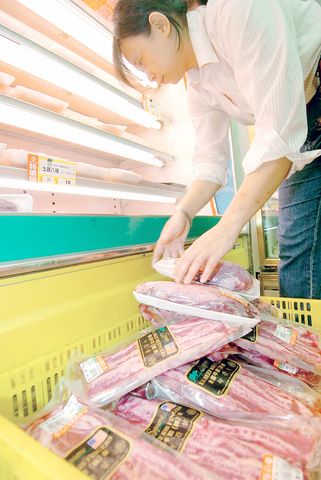The Cabinet yesterday reinstated a ban on US beef after the US Department of Agriculture confirmed a second case of mad-cow disease.
"For everybody's safety, we hereby announce an end to imports of US beef because of a second confirmed case of mad-cow disease in the US," Cabinet Spokesman Cho Jung-tai (卓榮泰) said.
Cho urged the public not to panic and said that all US beef in stock at present could be safely eaten because all of the beef was boneless meat from cows younger than 30 months, unlike the cow that has sparked the latest scare.

PHOTO: CHIEN JUNG-FUNG, TAIPEI TIMES
"However, because a new case of mad-cow disease has been confirmed, we must announce the ban on US beef," Cho said.
Premier Frank Hsieh (謝長廷) said that the government was simply taking all necessary precautions to prevent the potential spread of the disease, but that current stocks should be of no concern.
"British research and experiments showed that it is quite impossible for younger cows to have mad-cow disease, and that is why we only imported those cows that are younger than 30 months," Hsieh said. "The meat we have at shops now is safe. No problem."
Bureau of Food Safety director Chen Lu-hung (
"Countries like Canada and Mexico say that they will continue to import US beef despite confirmation of the disease," Chen said.
The first case of the disease in the US was confirmed on Dec. 24, 2003. Taiwan banned US beef a week later.
The US Department of Agriculture then filed a request to Taiwan's Department of Health on March 29 last year to lift the ban, but the request was not granted until April 16 this year.
The decision to lift the ban has been criticized because of concerns that the disease could spread to Taiwan anyway.
Current regulations require that US beef imports be boneless meat from cows younger than 30 months.
American Institute in Taiwan Director Douglas Paal helped to promote US beef on June 16 while attending the 2005 Taipei International Food Show.
"American beef is 100-percent safe," he had said in Mandarin, eating slices of beef for the media.
Taiwan is the sixth-largest market for US beef, and was worth US$325 million in 2003. Japan is the No.1 market, and was worth NT$1.4 billion in the same year.
Several members of the Consumers' Foundation yesterday harshly criticized the Department of Health's earlier decision to lift the ban.
The foundation urged the government to recall all US beef already on store shelves "in consideration of local consumers' health," adding that it might mobilize consumers to boycott US beef if the government did not do so.
Foundation vice chairman Cheng Hung-jen (程宏仁) said that nobody could be certain about the incubation period, and he claimed the lifting of the ban had come about through "political considerations."

MAKING WAVES: China’s maritime militia could become a nontraditional threat in war, clogging up shipping lanes to prevent US or Japanese intervention, a report said About 1,900 Chinese ships flying flags of convenience and fishing vessels that participated in China’s military exercises around Taiwan last month and in January last year have been listed for monitoring, Coast Guard Administration (CGA) Deputy Director-General Hsieh Ching-chin (謝慶欽) said yesterday. Following amendments to the Commercial Port Act (商港法) and the Law of Ships (船舶法) last month, the CGA can designate possible berthing areas or deny ports of call for vessels suspected of loitering around areas where undersea cables can be accessed, Oceans Affairs Council Minister Kuan Bi-ling (管碧玲) said. The list of suspected ships, originally 300, had risen to about

DAREDEVIL: Honnold said it had always been a dream of his to climb Taipei 101, while a Netflix producer said the skyscraper was ‘a real icon of this country’ US climber Alex Honnold yesterday took on Taiwan’s tallest building, becoming the first person to scale Taipei 101 without a rope, harness or safety net. Hundreds of spectators gathered at the base of the 101-story skyscraper to watch Honnold, 40, embark on his daredevil feat, which was also broadcast live on Netflix. Dressed in a red T-shirt and yellow custom-made climbing shoes, Honnold swiftly moved up the southeast face of the glass and steel building. At one point, he stepped onto a platform midway up to wave down at fans and onlookers who were taking photos. People watching from inside

Japan’s strategic alliance with the US would collapse if Tokyo were to turn away from a conflict in Taiwan, Japanese Prime Minister Sanae Takaichi said yesterday, but distanced herself from previous comments that suggested a possible military response in such an event. Takaichi expressed her latest views on a nationally broadcast TV program late on Monday, where an opposition party leader criticized her for igniting tensions with China with the earlier remarks. Ties between Japan and China have sunk to the worst level in years after Takaichi said in November that a hypothetical Chinese attack on Taiwan could bring about a Japanese

STREAMLINED: The dedicated funding would allow the US to transfer equipment to Taiwan when needed and order upgraded replacements for stockpiles, a source said The US House of Representatives on Thursday passed a defense appropriations bill totaling US$838.7 billion, of which US$1 billion is to be allocated to reinforcing security cooperation with Taiwan and US$150 million to replace defense articles provided to the nation. These are part of the Consolidated Appropriation Act, which the US House yesterday passed with 341 votes in favor and 88 against. The act must be passed by the US Senate before Friday next week to avoid another government shutdown. The US House Committee on Appropriations on Monday unveiled the act, saying that it allocates US$1 billion for the Taiwan Security Cooperation Initiative